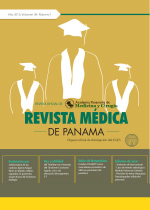Características metabólicas en infarto agudo de miocardio

Autores/as
DOI:
https://doi.org/10.37980/im.journal.rmdp.20232263Palabras clave:
perfil lipídico, factores de riesgo cardiovascular, infarto de miocardioResumen
Introducción: las alteraciones del control glicémico y los lípidos son causas principales de enfermedad cardiovascular. Sin embargo, los patrones metabólicos en el infarto agudo de miocardio no están bien establecidos. Objetivo: el propósito de esta investigación es describir las características metabólicas en pacientes admitidos con infarto de miocardio. Clasificamos los pacientes según el cociente HDL-c/LDL-c y perfiles lipídicos. Método: estudio observacional, descriptivo, retrospectivo en pacientes admitidos al Servicio de Cardiología con infarto agudo de miocardio durante un año. Resultados: 97 pacientes fueron incluidos, predominó el sexo masculino (67%) y el promedio de edad fue 59 años (SD, ±9.9). Las características metabólicas fueron las siguientes: mediana de hemoglobina glicosilada 6.2% (IQR, 5.8-7.5), glucemia en ayunas 107 mg/dL (IQR, 99-152), colesterol total 201 mg/dL (IQR, 165-223), colesterol asociado a lipoproteínas de baja densidad (LDL-c) 123 mg/dL (IQR, 96-146), colesterol asociado a lipoproteínas de alta densidad (HDL-c) 38.2 mg/dL (IQR, 31.8-45.4) y triglicéridos (TG) 161 mg/dL (IQR, 103-234). El cociente HDL-c/LDL-c <0.4 estuvo presente en 75% de los pacientes. Los patientes fueron clasificados según perfiles lipídicos, donde el perfil L-1 [HDL-c ≤40, LDL-c <150, TG <200] y L-2 [HDL-c >40, LDL-c <150, TG <200] en conjunto representaron la mitad de la muestra. Conclusiones: prediabetes, bajos niveles de HDL-c y un cociente HDL-c/LDL-c <0.4 fueron hallazgos frecuentes en infarto de miocardio. La relación entre patrones metabólicos y el riesgo de infarto de miocardio debe ser investigada.
Archivos adicionales
Publicado
Número
Sección
Licencia
Derechos de autor 2023 Infomedic Intl.Derechos autoriales y de reproducibilidad. La Revista Médica de Panama es un ente académico, sin fines de lucro, que forma parte de la Academia Panameña de Medicina y Cirugía. Sus publicaciones son de tipo acceso gratuito de su contenido para uso individual y académico, sin restricción. Los derechos autoriales de cada artículo son retenidos por sus autores. Al Publicar en la Revista, el autor otorga Licencia permanente, exclusiva, e irrevocable a la Sociedad para la edición del manuscrito, y otorga a la empresa editorial, Infomedic International Licencia de uso de distribución, indexación y comercial exclusiva, permanente e irrevocable de su contenido y para la generación de productos y servicios derivados del mismo. En caso que el autor obtenga la licencia CC BY, el artículo y sus derivados son de libre acceso y distribución.






